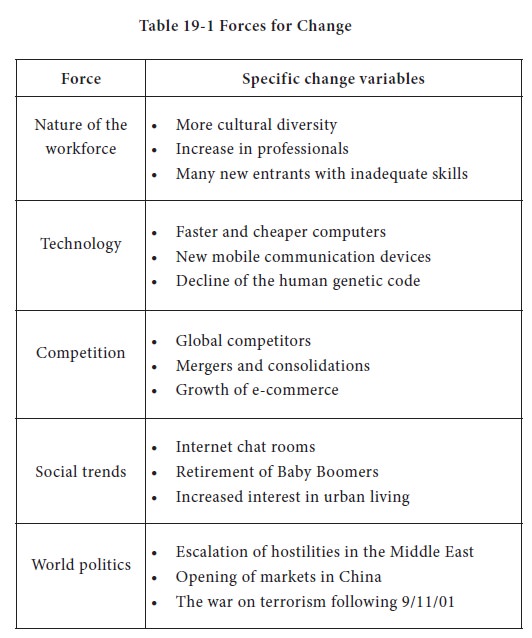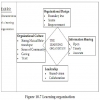Strategic Management - Strategy Implementation
Reasons for Change - Managing Change
Posted On :
More and more organizations today face a dynamic changing environment.
Reasons for Change
More and more organizations today face a dynamic changing environment. This, in turn, requires them to adapt. “Change or chaos”, is the rallying cry among mangers today world wide. Table 19-1 summarizes the six specific forces that are acting as stimulants for change.

For instance, almost every organization has to adjust to a multicultural environment. Human resource policies and
practices have to change in order to attract and keep this more diverse workforce. And many companies have to spend large amounts of money on training to upgrade reading, match, computer, and other skills of employees.
For instance, computers are now common place in almost every organization; and cell phones and hand-held PDAs are being increasingly perceived as necessities by a large segment of the population.
The global economy means that competitors are as likely to come from across the ocean as from across town. Heightened competition also makes it necessary for established organizations to defend themselves against both traditional competitors who develop new products and services and small, entrepreneurial firms with innovative offerings. Successful organizations will be the ones that can change in response to the competition.
For instance, in contrast to just ten years ago, people are meeting and sharing information in Internet chat rooms; The youth has become more aggressive. The old aged people are increasing in number. Rural areas are developing and rual market is becoming attractive.
No one could have imagined how world politics would change in recent years. We’ve seen the breakup of the Soviet Union; the opening up of South Africa and China; almost daily suicide bombings in the Middle East; and, of course, the rise of Muslim fundamentalism. The attacks on New York and Washington on September 11, and the subsequent war on terrorism, has led to changes in business practices related to the creation of backup systems, employee security, employee stereotyping and profiling, and post-terrorist-attack anxiety.
More and more organizations today face a dynamic changing environment. This, in turn, requires them to adapt. “Change or chaos”, is the rallying cry among mangers today world wide. Table 19-1 summarizes the six specific forces that are acting as stimulants for change.

Workforce Diversify
For instance, almost every organization has to adjust to a multicultural environment. Human resource policies and
practices have to change in order to attract and keep this more diverse workforce. And many companies have to spend large amounts of money on training to upgrade reading, match, computer, and other skills of employees.
Technology
For instance, computers are now common place in almost every organization; and cell phones and hand-held PDAs are being increasingly perceived as necessities by a large segment of the population.
Competition
The global economy means that competitors are as likely to come from across the ocean as from across town. Heightened competition also makes it necessary for established organizations to defend themselves against both traditional competitors who develop new products and services and small, entrepreneurial firms with innovative offerings. Successful organizations will be the ones that can change in response to the competition.
Social trends Society doesn’t remain static
For instance, in contrast to just ten years ago, people are meeting and sharing information in Internet chat rooms; The youth has become more aggressive. The old aged people are increasing in number. Rural areas are developing and rual market is becoming attractive.
World politics
No one could have imagined how world politics would change in recent years. We’ve seen the breakup of the Soviet Union; the opening up of South Africa and China; almost daily suicide bombings in the Middle East; and, of course, the rise of Muslim fundamentalism. The attacks on New York and Washington on September 11, and the subsequent war on terrorism, has led to changes in business practices related to the creation of backup systems, employee security, employee stereotyping and profiling, and post-terrorist-attack anxiety.
Tags : Strategic Management - Strategy Implementation
Last 30 days 695 views
















